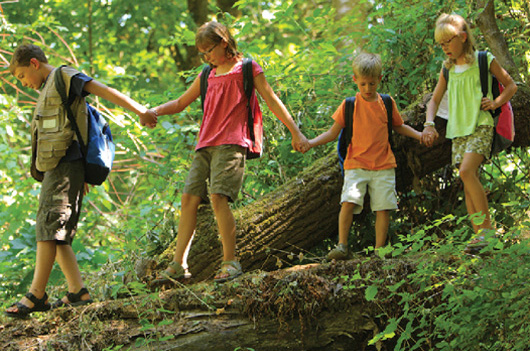Choosing A Summer Camp
How to Find the Best Fit for Your Child

By Daniel Beauregard and Anna Bentley
Summer is still months away. But for parents who want to turn those
lazy summer days into exciting opportunities for learning and adventure for their children, it’s not too early to begin searching for a summer camp. Summer camps across metro Atlanta pair educational activities with recreational favorites, keeping kids active, engaged and learning all the way through August. If you’re interested in enrolling your child in a summer camp, the time to begin planning is now, since spots fill up well before the start of summer. Here are a few of the different types of camps available, along with tips for picking the right one for your child.Your first choice is to decide between day camp and overnight camp. The difference boils down to much more than whether your child comes home at the end of the day.
“Overnight camps are great for kids who are comfortable being away from home and family, who make friends easily, adapt well and are excited about new situations and adventures,” says John Dovic, camp director for High Meadows Camp. These camps teach children independence and how to rely on themselves away from the comforts of home. Day camps, meanwhile, “are a good choice for children and parents who are not completely comfortable being apart for an extended amount of time, and for kids who might have other evening or weekend obligations,” he says.
Once you’ve decided which type of camp is best for your child’s age and development, there are a great many options to choose from—many of them specializing in a particular pursuit, such as academics, dance, science or even circus arts.
Traditional Summer Camps
When most of us think of summer camp, we envision a strong focus on outdoor activities such as swimming, archery or canoeing. High Meadows Camp offers a traditional camp setting focused on the outdoors and experiential learning, in which campers learn about subjects through direct, hands-on experience. High Meadows, which accepts children ages 4 through 14, offers a range of activities including arts and crafts, Native American lore, pony rides, swimming and more.
Over a three-week session, campers explore new activities, grow and achieve success. “If they’ve never shot a bow and arrow before, by the end of three weeks they’ll certainly have picked up some skill,” Dovic says.
Traditional camps give children time to explore their hidden talents and broaden their horizons. In today’s fast-paced world, it’s important to learn that there’s more to life than staring at a computer screen. “We really want the kids to disconnect from a lot of the electronic things that they’re learning in their typical day,” he says.
Specialized Studies
Other educational camps combine classroom learning with outdoor recreational activities to help students improve educationally—while still having plenty of fun in the process. Squirrel Hollow Camp at The Bedford School, a school for children with learning disabilities, pairs mornings of small-group tutoring with afternoon exploration of the school’s 45-acre Fairburn campus, including swimming, soccer and conquering the school’s challenge course.
“Squirrel Hollow is designed to provide academic tutoring in a recreational setting,” says Betsy Box, director of The Bedford School. “Students who attend all four weeks make average gains of six to eight months in reading, math and written expression.”
At McGinnis Woods Country Day School in Alpharetta, campers enjoy physical and educational activities. Academic camps offer students the ability to focus on one subject for the entire week. The camp also features a new sport court, a turf field, multiple playground areas, and a mini-rock climbing volcano. Campers also take an educational field trip each week; past camps have visited the Atlanta Botanical Garden, the Center for Puppetry Arts and Cagle’s Family Farm.
Pursuing Your Passion
Other camps afford children the opportunity to pursue a particular interest or passion. The Atlanta Young Writers Institute (AYWI), a nonprofit organization that fosters and develops the skills of adolescent writers, hosts a week-long writing workshop for seventh- and eighth-graders and a two-week intensive writing course for students in high school. Students, who must apply to the program, work on creative writing projects and attend field trips.
“We also have professional writers visit the classes and do team-building because we want to build a sense of real community among students,” says founder Leslie Quigless.
For pint-sized scientists, there are plenty of specialized science camps covering topics like video game development, computer programming, veterinary medicine, forensics, robotics and biology.
Other science-based specialty camps include those offered by the Georgia Institute of Technology’s Center for Education Integrating Science, Mathematics, and Computing (CEISMC), and Camp H2O at the Georgia Aquarium. Georgia Tech’s programs are mostly for middle- and high-school students and focus on STEM (Science, Technology, Engineering and Mathematics) topics such as robotics, computer programming and modeling. Camp H2O, meanwhile, is geared toward students in grades 1-5, giving them a behind-the-scenes look at the aquarium and its residents through animal encounters and lessons from caregivers.
The Young Chefs Academy (YCA) hosts Camp I-Can-Cook Mini Camps during which children will make dishes from various cuisines with a twist. Campers won’t know what to expect, whether it’s making food from Italy or France, or creating chocolate confections.
“Even at the age of 4 and 5, a lot of kids love to participate in the kitchen in some way, shape or form,” says YCA’s Jennifer Fox.
Making Your Selection
So how do you go about finding a camp? The American Camp Association’s website (www.acacamps.org) is a great resource, with more than 2,300 accredited camps. “After researching the different kinds of educational options available, it’s time to narrow down your options. But that’s only half of the equation,” says Peg Smith, CEO of the American Camp Association. Smith recommends taking a collaborative approach to choosing the right summer camp for your child. Talk with your child about his interests and expectations for summer camp, match them to your own, and then do your homework to select the best option.
How are counselors selected and trained? What is the camp’s counselor-to-camper ratio? How does the camp approach communication with parents? What are its emergency procedures? How well-maintained are its facilities? These are all questions parents should ask their top choices. Also, ask if the camp is accredited, and if not, why not. “Accreditation is an entirely voluntary process that shows a commitment to your child’s safety and well-being,” Smith says.
Lastly, get excited about camp—and make sure to share that excitement with your child. Talk about all the fun things he will do and the things he will learn, especially if it’s his first time at camp or if he seems hesitant to branch out on his own.
“The greatest gift you can give your child is helping them become independent,” says Smith. “The camp experience is a great way to do that. It’s a good way to grow that resilience and that independence, as well as provide them with enrichment opportunities.”
Camps Outside Georgia
Looking for an overnight camp a little farther away? There are a variety of fun and educational summer camps in the states surrounding Georgia.
Frist Center for the Visual Arts, Nashville, TN
615-244-3340 | fristcenter.org
Calling all budding artists – the Frist Center for Visual Arts is just for you! At this camp in Nashville, Tenn., children ages 5-10 can experience one-of-a-kind art classes, such as 2D and 3D design; science, technology, engineering, and math art experiments and projects; and learning photographic and filmmaking techniques. Need-based scholarships are available for these programs.
Space Camp, Huntsville, AL
800-637-7223 | spacecamp.com
Kids can train like astronauts at the U.S. Space and Rocket Center’s Space Camp in Huntsville, Ala. The camps, for children ages 9-18, include space robotics, single student flight simulators, head-to-head simulations with other squadrons, a ropes course and scuba diving in the camp’s Underwater Astronaut Trainer.
Seacamp, Big Pine Key, FL
305-872-2331 | seacamp.org
Seacamp offers budding marine biologists courses in science and scuba as well as other fun activities like kayaking, sailing, windsurfing, fishing and arts and crafts. Students can also study more than 400 varieties of fish, coral and algae found in the Keys.
Need Atlanta Summer Camp Info?
View Newcomer's Summer Camp Directory here.








